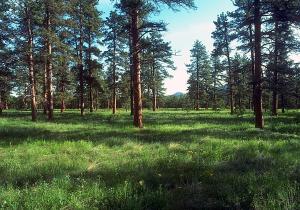Research Initiatives
Research initiatives are targeted, 2- to 5-year coproduction efforts, with topics identified through partner input. For each initiative, the PNW Research Station will work with partners to develop a research agenda, address research questions or information needs, deliver results, and provide consultation. Initiatives can address one or more of our research priority areas.
In 2019, to strengthen collaboration with National Forest System and other partners, we launched the following pilot initiatives:
Carbon dynamics for land and watershed managers
The Western states including Washington, Oregon, California, Alaska, and Hawaii are leaders in carbon markets. This research initiative aims to address unresolved questions regarding carbon dynamics, accounting, and the sequestration potential of carbon in Pacific Northwest forests and watersheds. Another goal is to cultivate long-term relationships with partners. State agencies have been major proponents of this work and acknowledge the tremendous need for National Forest System involvement given the desire to manage across boundaries, and that our agency stewards the most extensive carbon stocks and potential for flux in the region.
Priority topics were identified and translated to research projects addressing the following goals:
- Design carbon management scenarios to model in carbon management and policy assessment.
- Review and synthesize carbon models for application.
- Project harvested wood products and substitution effects from modeled scenarios.
- Identify landowner/manager responses to incentives and scenarios.
- Explore compatibility/tradeoffs between managing for carbon and other forest management goals.
- Assess barriers and opportunities for promoting carbon-oriented forest management by public, tribal, and private landowners.
- Synthesize and publish a literature review of Pacific coast carbon scenarios, modeling efforts, and management and disturbance impacts.
West-side fire and climate adaptation
The station initiated the west-side fire and climate adaptation initiative to respond to growing concern about increasingly frequent large fires in mesic, jurisdictionally complex forests on the west side of the Cascade Range in Oregon and Washington. The initiative’s primary goal is to provide actionable science that improves wildland fire management decisionmaking in these complex landscapes.
Priority topic areas identified by scientists and practitioners include the following:
- Historical and future range of variability of wildfire.
- Marine layer influence on extreme fire weather.
- Understanding landowner decisionmaking about wildfire management on their properties to mitigate hazard and risk.
- Strategic fuel management and treatment effectiveness.
- Fire effects on aquatic habitat.
- Postfire management.
Following the uncharacteristic fire season of late summer 2020, the research-management teams augmented the original study plans to incorporate work that can help in newly identified recovery and restoration efforts.
Northwest water
Launched in 2023, this initiative focuses on developing new knowledge that resource managers and policy makers can use to increase the resilience of watersheds to rapid environmental change. Research questions will be geographically focused on the forests and rangelands of Alaska, Washington, and Oregon, and guided by the diverse people who live, work, and play here. This targeted four-year enterprise focuses on critical research that addresses time-sensitive problems that are collaboratively defined by the PNW Research Station and its many collaborators.
The work under this initiative is organized around three themes:
- Water quantity and quality.
- Aquatic ecology.
- Aquatic-riparian ecosystem management and restoration.
Community socioeconomic well-being and resilience in southeast Alaska
This research initiative will focus on specific information needs of communities adjacent to the Tongass National Forest and the forest products industry. The PNW Research Station is hosting a convening in 2023 with partners and scientists to begin identifying information needs that overlap with station’s research expertise on topics such as community socioeconomic conditions, potential small-diameter forest products and markets, contemporary rural subsistence patterns, and community-level impacts of the transition from old-growth to young-growth timber harvest. Once the initiative’s themes are finalized, they will be posted here.
Research Initiatives
-
Center or Group
-
Center or Group
-
Center or Group






